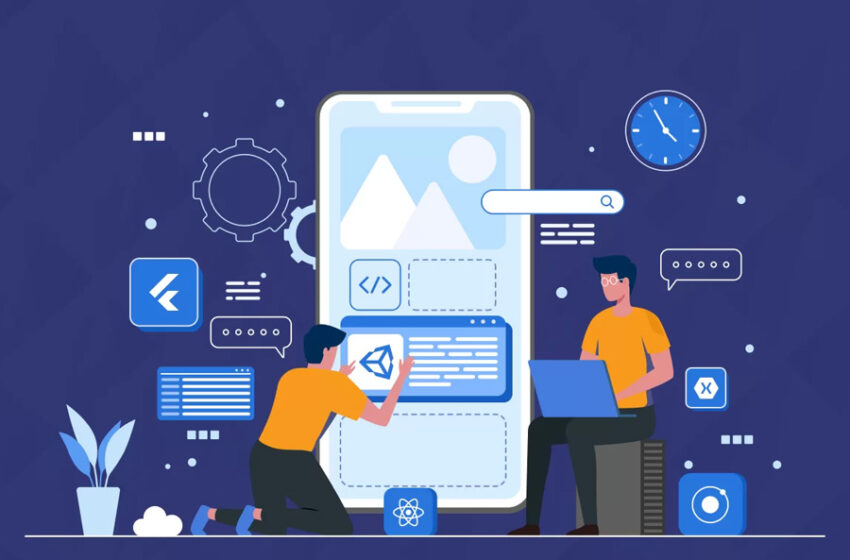Building Engaging Mobile Apps: A Comprehensive Guide
In today’s digital age, multi-platform mobile app development has become an integral part of our daily lives. From social media to productivity tools, there’s an app for almost everything. Building a successful mobile app requires a combination of technical expertise, user-centric design, and effective marketing. In this comprehensive guide, we’ll explore the key steps involved in creating engaging mobile apps.
Understanding Your Target Audience
Before you start building your app, it’s crucial to understand your target audience. Who are you trying to reach? What are their needs and preferences? By identifying your target audience, you can tailor your app to meet their specific requirements and increase its chances of success.
Defining Your App’s Purpose and Features
Clearly define the purpose of your app and the key features it will offer. What problem does your app solve? What unique value does it provide? A well-defined app concept will guide your development process and ensure that your app delivers on its promises.
Choosing the Right Platform
Decide whether you want to develop your app for iOS, Android, or both platforms. Each platform has its own development environment, guidelines, and user base. Consider factors such as your target audience’s preferred devices and your development team’s expertise when making your decision.
Designing a User-Friendly Interface
A great user interface (UI) is essential for a successful mobile app. Focus on creating a clean, intuitive, and visually appealing design. Use clear and concise labels, consistent navigation, and appropriate typography. Consider the user experience (UX) from the very beginning and test your app with real users to gather feedback.
Developing Your App
Once you have a solid foundation, it’s time to start developing your app. Choose the appropriate programming language and development tools for your chosen platform. Consider using a cross-platform framework like React Native or Flutter to develop apps for both iOS and Android simultaneously.
Testing and Debugging
Thorough testing is crucial to ensure your app functions correctly and provides a seamless user experience. Test your app on various devices and operating systems to identify and fix any bugs or issues. Use testing tools and frameworks to automate testing and improve efficiency.
App Store Optimization (ASO)
To increase your app’s visibility and downloads, focus on App Store Optimization (ASO). Optimize your app’s title, description, keywords, and screenshots to improve its ranking in search results. Conduct keyword research to identify relevant terms that your target audience is searching for.
Marketing and Promotion
Once your app is ready, it’s time to promote it. Create a marketing plan that includes social media campaigns, content marketing, influencer partnerships, and app store advertising. Track your marketing efforts to measure their effectiveness and make adjustments as needed.
Post-Launch Updates and Maintenance
After launching your app, continue to monitor its performance and gather user feedback. Regularly update your app with new features, bug fixes, and performance improvements. Address user feedback and make necessary changes to enhance the user experience.
Building Engaging Mobile Apps: A Summary
Building a successful mobile app requires a combination of technical skills, creativity, and a deep understanding of your target audience. By following the steps outlined in this guide, you can create engaging and user-friendly apps that stand out in the competitive mobile app market.
Advanced Mobile App Development Techniques
Building upon the previous exploration of mobile app development, let’s delve deeper into specific areas:
Hybrid App Development
- Cross-Platform Frameworks: Leverage frameworks like React Native or Flutter to develop apps for both iOS and Android using a single codebase.
- Performance Optimization: Optimize hybrid apps for performance using techniques like code splitting and native modules.
- Hybrid App Limitations: Understand the limitations of hybrid apps, such as potential performance trade-offs.
Progressive Web Apps (PWAs)
- Offline Functionality: Enable users to access your app even when offline.
- Push Notifications: Send notifications to users even when your app is not open.
- Installation: Allow users to install your PWA on their home screen for a native-like experience.
Augmented Reality (AR) and Virtual Reality (VR)
- AR and VR Development Kits: Use AR and VR development kits to create immersive experiences.
- Use Cases: Explore potential use cases for AR and VR in your app, such as gaming, education, or retail.
- User Experience: Design AR and VR experiences that are intuitive and engaging.
Mobile App Security
- Data Encryption: Protect sensitive user data using encryption techniques.
- Secure Authentication: Implement secure authentication methods to prevent unauthorized access.
- Regular Updates: Keep your app updated with the latest security patches.
Mobile App Analytics
- User Behavior Tracking: Track user behavior to understand how users interact with your app.
- A/B Testing: Experiment with different app features and designs to optimize user engagement.
- Performance Metrics: Monitor app performance metrics like load times and crash rates.
Monetization Strategies
- In-App Purchases: Offer in-app purchases to generate revenue.
- Freemium Model: Offer a basic version of your app for free and charge for premium features.
- Subscription Model: Provide access to premium features or content through a subscription model.
- Advertising: Display ads within your app to generate revenue.
Future Trends in Mobile App Development
- Artificial Intelligence (AI): Incorporate AI features like natural language processing and machine learning into your app.
- Internet of Things (IoT): Integrate your app with IoT devices to create connected experiences.
- Wearable Technology: Develop apps for wearable devices like smartwatches and fitness trackers.
By exploring these advanced techniques, you can create even more sophisticated and innovative mobile apps that stand out in the competitive market.
Future Trends in Mobile App Development
Mobile app development is a rapidly evolving field, with new technologies and trends emerging constantly. Here are some of the key future trends to watch out for:
Artificial Intelligence (AI) and Machine Learning (ML)
- Personalized Experiences: AI and ML can be used to create personalized experiences for users based on their preferences and behavior.
- Chatbots and Virtual Assistants: AI-powered chatbots and virtual assistants can provide customer support and enhance user engagement.
- Image and Speech Recognition: AI can enable apps to recognize images and speech, opening up new possibilities for interaction.
Internet of Things (IoT)
- Connected Devices: Mobile apps can integrate with IoT devices to create connected experiences.
- Data Analysis: Apps can collect and analyze data from IoT devices to provide valuable insights.
- Automation: IoT-enabled apps can automate tasks and create smart homes and workplaces.
Wearable Technology
- Smartwatches and Fitness Trackers: Develop apps for wearable devices to track fitness, health, and other metrics.
- Augmented Reality (AR) Glasses: Explore the potential of AR glasses for interactive experiences and information overlays.
Augmented Reality (AR) and Virtual Reality (VR)
- Immersive Experiences: AR and VR can create immersive experiences for gaming, education, and entertainment.
- Interactive Content: Develop AR and VR apps that allow users to interact with digital content in a new way.
- Accessibility: Ensure that AR and VR experiences are accessible to users with disabilities.
Blockchain Technology
- Decentralized Apps (DApps): Build decentralized applications that leverage blockchain technology for security, transparency, and trust.
- Cryptocurrency Integration: Integrate cryptocurrency payments into your app.
- Supply Chain Management: Use blockchain to track and manage supply chains.
5G Connectivity
- Faster Speeds: 5G networks will enable faster download and upload speeds, improving app performance.
- Low Latency: 5G will reduce latency, making real-time applications and interactions possible.
- New Use Cases: Explore new use cases enabled by 5G, such as augmented reality, remote control, and autonomous vehicles.
Sustainability and Ethical Considerations
- Eco-Friendly Apps: Develop apps that promote sustainability and reduce environmental impact.
- Ethical AI: Ensure that AI is used ethically and responsibly.
- Data Privacy: Prioritize data privacy and security in your app development.
By staying informed about these future trends, you can position your mobile app business for success in the ever-evolving mobile app landscape.
Sustainability in Mobile App Development: A Deep Dive
Sustainability is becoming an increasingly important consideration in all aspects of our lives, and mobile app development is no exception. By incorporating sustainable practices into your app development process, you can contribute to a more environmentally friendly and socially responsible digital world.
Eco-Friendly App Design
- Energy Efficiency: Optimize your app’s code and design to minimize energy consumption.
- Resource Conservation: Use resources efficiently, such as memory and storage.
- Battery Optimization: Design your app to conserve battery life on mobile devices.
Sustainable Development Practices
- Green Hosting: Choose a web hosting provider that uses renewable energy sources.
- Ethical Sourcing: Ensure that the materials used in your app development process are sourced ethically.
- Fair Labor Practices: Support fair labor practices throughout your development team and supply chain.
Sustainable App Features
- Carbon Footprint Calculator: Incorporate a carbon footprint calculator to help users understand their environmental impact.
- Eco-Friendly Recommendations: Provide users with recommendations for sustainable products or services.
- Donation Integration: Allow users to donate to environmental causes directly from your app.
Ethical AI Development
- Bias Awareness: Be aware of potential biases in AI algorithms and take steps to mitigate them.
- Data Privacy: Protect user data and comply with data privacy regulations.
- Transparency: Be transparent about how AI is used in your app.
Social Impact
- Accessibility: Design your app to be accessible to users with disabilities.
- Community Engagement: Encourage user engagement and community building within your app.
- Philanthropic Initiatives: Support charitable causes or social initiatives through your app.
Measuring Sustainability
- Environmental Impact Assessment: Conduct an assessment to measure the environmental impact of your app.
- User Feedback: Gather feedback from users to understand their perceptions of your app’s sustainability.
- Sustainability Metrics: Track key sustainability metrics, such as energy consumption and resource usage.
By incorporating sustainability into your mobile app development process, you can create apps that not only provide value to users but also contribute to a more sustainable future.


